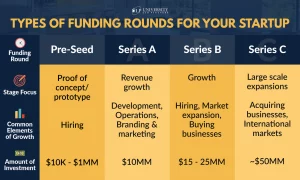
When it comes to starting a new business, one of the most important factors is securing funding. In the world of startups, there are several funding rounds that companies go through to raise capital. Each round is designed to help the company achieve certain goals, such as developing a prototype, expanding into new markets, or preparing for an IPO.
- Pre-seed funding: This is the earliest stage of funding for startups. It typically involves friends and family, angel investors, or accelerator programs. Pre-seed funding may be used to develop a concept, build a prototype, or conduct market research.
Example: A startup with a new idea for a mobile app may raise $50,000 in pre-seed funding from an angel investor to develop a prototype and conduct market research.
- Seed funding: This round of funding is used to help startups develop their products or services and start generating revenue. Seed funding may come from angel investors, venture capital firms, or crowdfunding platforms.
Example: A startup that has developed a prototype for a new software application may raise $500,000 in seed funding from a group of angel investors to further develop the product and start generating revenue.
- Series A: This funding round is used to help startups expand their operations and reach a wider audience. Series A funding may come from venture capital firms or private equity investors.
Example: A startup that has developed a successful product and has generated revenue may raise $5 million in a Series A round from a group of venture capital firms to expand into new markets.
- Series B and beyond: Once a startup has reached a certain level of success, it may continue to raise funds through additional funding rounds, such as Series B, C, D, E, and so on. These rounds are typically used to help the startup accelerate its growth, make acquisitions, or prepare for an IPO.
Example: A startup that has become a major player in its industry may raise $100 million in a Series C round from a group of venture capital firms, with the goal of expanding its operations and making strategic acquisitions.
In conclusion, startups can raise funds through different funding rounds to achieve various goals. From pre-seed funding to Series A, B, C, and beyond, each funding round helps startups raise the capital they need to succeed. By understanding the different funding rounds and their purposes, startups can plan their fundraising efforts better and achieve their growth objectives.
Regville Associates offers end-to-end legal, secretarial, tax and compliance service for companies. Our services aid companies in achieving and sustaining compliance with regulations.
Feel free to contact us.
Tolulope Oguntade Regville Associates info@regville.com 08065111667